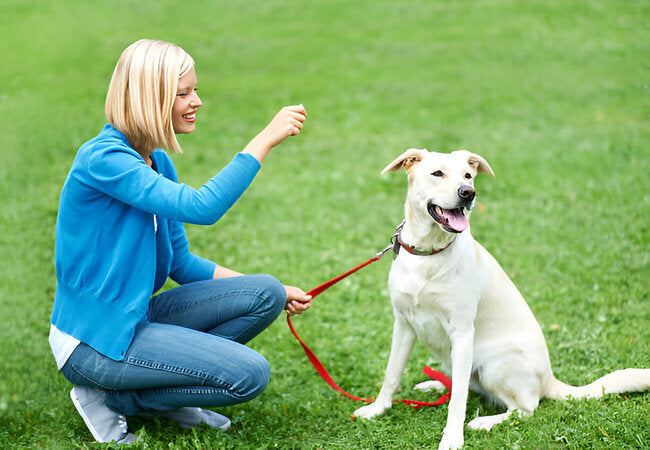Tips for Basic Obedience Training in 2025 – Vet‑Approved Guide to Building Trust & Skills 🐶🦮

In this article
Tips for Basic Obedience Training in 2025 – Vet‑Approved Guide to Building Trust & Skills 🐶🦮
By Dr. Duncan Houston BVSc
Teaching your dog basic obedience commands is about more than instant control—it builds lifelong trust and understanding. In this 2025 guide, we dive into the essentials: establishing a clear communication system, using reward-based techniques, avoiding common pitfalls, and creating consistent habits that strengthen your bond. Let’s get started! ✨
1. 🧭 Start with Clear, Consistent Cues
Choose simple one-word cues (e.g., “sit,” “come,” “down,” “stay”) and use them consistently. According to PetMD and behavior experts, consistency helps dogs learn faster by reducing confusion .
- 🗣️ Use the cue just once per repetition.
- ⌛ Pair the cue closely with the desired behavior and reward.
- 💬 Ensure every family member uses the same words.
2. 🎯 Motivate with High-Value Rewards
Find what lights up your dog—sometimes it’s treats, other times toys or praise. “Using your dog’s currency” boosts enthusiasm and learning .
- 🍖 Food: soft, aromatic, and easy to eat quickly
- 🎾 Toys or playtime: for active or toy-driven dogs
- 🗣️ Praise and access to fun activities
3. ⏱️ Keep Sessions Short & Sweet
Puppies have short attention spans, and adult dogs still respond best to 5–10 minute focused sessions. Frequent, fun training helps retention and enjoyment .
- ✅ Aim for 2–3 sessions daily.
- 🔁 End each session on a success note.
- 🎉 Vary cues to keep engagement high.
4. 🔁 Mark the Moment with Precision
Use a clicker—or a marker like “Yes!”—to pinpoint the exact moment your dog performs correctly. This bridges the action and the reward clearly .
- 🛎️ Click as behavior finishes, then treat immediately.
- 🧠 This clarity accelerates learning and reduces confusion.
5. 🌱 Start Simple & Gradually Increase Difficulty
- ✅ Begin in a quiet, familiar environment
- 📚 Once reliable, add mild distractions (e.g., different room)
- 🌎 Move to public areas—with short durations and tidy successes
Slow progress helps your dog generalize behaviors across settings gentlly.
6. 💬 Reinforce Positivity Over Punishment
Harsh corrections can harm trust and create anxiety. Instead, ignore unwanted behaviors and reward what you want to see .
- 🛑 No scapegoating or punishment.
- 👍 Use a firm “No” or “Leave it” followed by redirection.
- 👂 Reward calm behavior and focus, not chaos.
7. 🐕🦺 Teach These Core Commands
- Come: A lifesaver—pair with rewards in controlled settings.
- Sit: Teaches self-control and settles excitement.
- Down: Encourages calm posture and focus.
- Stay: Introduces patience and delayed gratification.
- Leave it: Keeps dogs safe from triggers or hazards.
8. 🛑 Troubles and Quick Fixes
- 🎭 Jumping: ignore until all four paws are on the floor, then reward.
- 🔊 Barking: reward silence and redirect to an alternative behavior.
- 🐾 Distracted: fade distractions early, then rebuild focus gradually.
9. 🔄 Proof Behaviors for Reliability
Practice commands in new places, with more distractions, and with different people. Consistency in variable contexts cements obedience .
10. 🧠 Enrichment to Support Training
- 🧩 Use food puzzles or trick training to build problem-solving and mental stamina
- 🚶 Keep walking schedules and off-leash play for physical and mental balance .
11. 📱 Ask A Vet App 2025 Support
Need help refining your training?
- 📹 Upload training videos for expert feedback
- 🧩 Receive personalized cue, technique, and reward strategies
- 💬 Talk live with vets and certified trainers
❤️ Final Thoughts
Basic obedience is more than just following commands—it's a foundation of trust, communication, and partnership. Using consistent cues, high-value rewards, thoughtful progression, and expert reinforcement, you’ll create a resilient, joyful, and confident dog. In 2025, let’s build connection through kindness. 🐶🦮✨
Need tailored help? Visit AskAVet.com or download the Ask A Vet app for customized support and easy progress tracking.






